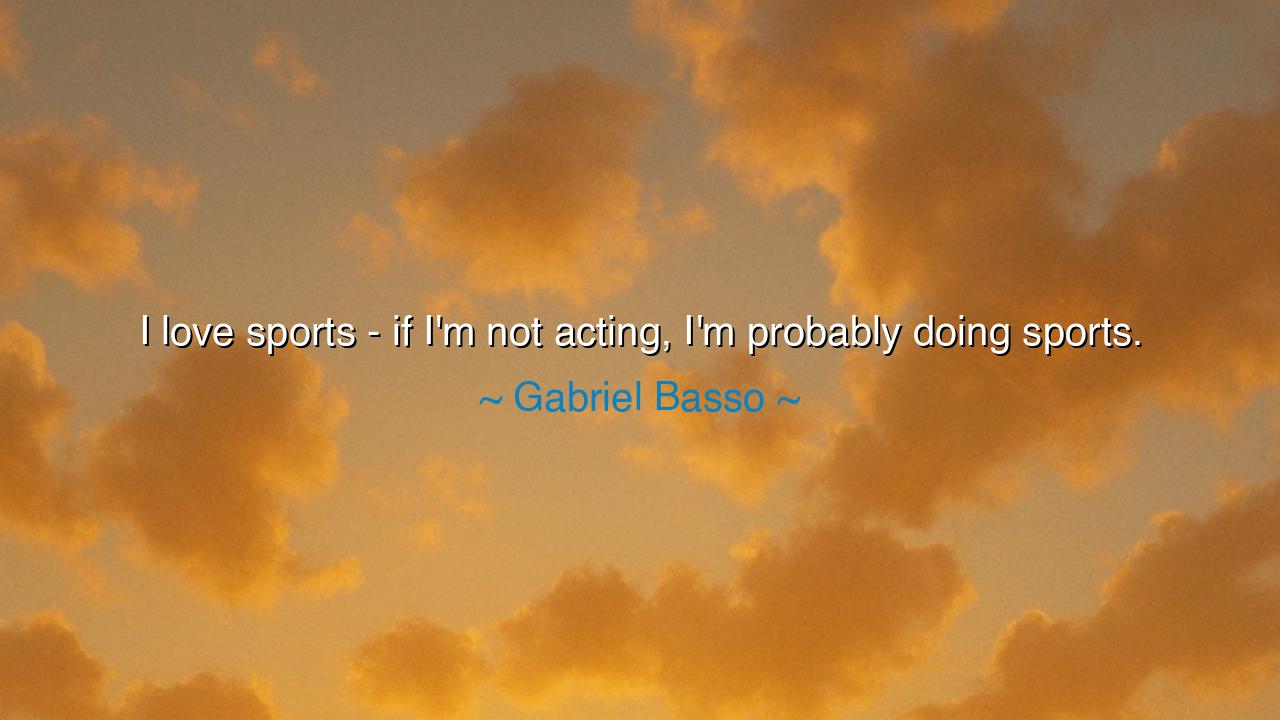
I love sports - if I'm not acting, I'm probably doing sports.






Gabriel Basso, in the simplicity of his confession, revealed a truth of balance and devotion when he said: “I love sports – if I’m not acting, I’m probably doing sports.” These words may seem plain to the ear, yet within them lies a harmony between the arts of body and the arts of spirit. They tell us that man is not one-dimensional, but a being woven of many threads — the stage and the field, the mind and the body, the performance of craft and the striving of play.
The first key to this wisdom lies in love. To love sports is not only to play games, but to embrace discipline, camaraderie, and the thrill of challenge. To love acting is not only to perform, but to embody stories, to express the depths of human emotion. By holding both loves close, Basso shows us that a soul thrives not by narrowing itself to one pursuit, but by allowing passion to flow in many directions. Thus, his words become a call to live fully, never chaining the heart to a single expression of self.
The ancients understood this union well. The Greeks celebrated the philosopher who trained in the gymnasium, the athlete who studied poetry, the orator who exercised his body as well as his mind. For they knew that sports sharpened discipline and resilience, while the arts awakened wisdom and beauty. To be complete was to cultivate both. Basso, in his life between the screen and the field, stands as a modern echo of this ancient harmony.
History gives us examples of great souls who embodied this dual path. Bruce Lee, though famed as a martial artist, was also a philosopher and actor, blending the physical with the intellectual to inspire the world. Arnold Schwarzenegger, an athlete of iron, became an actor of renown and a leader of men. In each of them, as in Basso’s words, we see the truth: when one is not engaged in one art, he pours himself into another, and in this balance the spirit finds renewal.
There is also a lesson about discipline hidden in his words. To shift from acting to sports is not to escape responsibility, but to practice constant devotion to a craft. It is a refusal to waste time in idleness. Whether shaping a character on screen or training the body in sport, Basso reveals the principle that greatness comes from constant engagement. The soul that rests too long grows dull, but the soul that keeps moving — in play, in art, in work — sharpens itself endlessly.
The deeper meaning is this: passion multiplies when fed in many forms. If we love only one pursuit, we risk burnout and exhaustion. But if we nurture several, each strengthens the other. The energy of sports feeds the energy of acting; the imagination of acting enriches the joy of sport. Just as rivers flow into the sea, so too do different passions flow into the greatness of a single life.
The lesson for us is clear: live in balance. Do not think yourself bound to one talent alone. Embrace the many gifts you have been given, and let them strengthen one another. Work with devotion, play with passion, and move with purpose. For it is in the weaving together of many pursuits that a human being finds wholeness.
Thus, Gabriel Basso’s words ring like a quiet hymn to balance: if he is not acting, he is doing sports. This is not the life of division, but the life of fullness. Children of tomorrow, remember this truth: give yourself to your work with love, but also to your play with joy, and in both, you will discover the art of living well.






AAdministratorAdministrator
Welcome, honored guests. Please leave a comment, we will respond soon